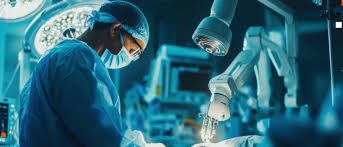Genesis MedTech And NUHS Launch AI Innovation Partnership To Advance The Future Of Surgery
19 November 2025 | Wednesday | News

Image Source : Public Domain
Genesis MedTech Group and the National University Health System (NUHS) have formed a strategic partnership to advance artificial intelligence (AI) in surgery and medical device innovation. This partnership stems from a Memorandum of Understanding signed earlier this year, with further details unveiled at the World Congress of Endoscopic Surgery (WCES).
As surgical challenges evolve, AI-driven technologies are enabling surgeons with data-driven insights to deliver safer, personalised and better outcomes for patients. At the same time, these innovations support hospitals in providing more cost-effective care.
Under this two-phase, four-year program, the Genesis MedTech–NUHS AI Innovation Partnership adopts a design-led approach to translate unmet needs into clinically meaningful solutions. This partnership will include co-innovating AI projects in surgery, engaging NUHS clinicians to enable stronger alignment between product development and real-word clinical needs and establishing the "Genesis-NUHS AI Innovation and Surgical Training Lab".
"Innovation in healthcare happens where clinicians and engineers meet," said Warren Wang, Chairman & CEO, Genesis MedTech. "Our partnership with NUHS represents our commitment to advancing AI-powered surgical innovation — built around real clinical challenges, developed hand-in-hand with hospitals."
Adjunct Professor Ngiam Kee Yuan, Head of AI Office, NUHS, said, "By combining NUHS's clinical and academic excellence with Genesis MedTech's global innovation platform, we aim to accelerate AI adoption to improve surgical care for patients in Singapore and internationally." Adjunct Professor Ngiam is also a Senior Consultant and Head of the Division of General Surgery (Endocrine & Thyroid Surgery), Department of Surgery, National University Hospital.
The Genesis–NUHS AI Innovation Partnership represents a long-term commitment to advancing healthcare through AI and close clinician-industry collaboration, making surgery safer, smarter and more accessible to patients worldwide.
Most Read
- How Does GLP-1 Work?
- Innovations In Magnetic Resonance Imaging Introduced By United Imaging
- Management of Relapsed/Refractory Multiple Myeloma
- 2025 Drug Approvals, Decoded: What Every Biopharma Leader Needs to Know
- BioPharma Manufacturing Resilience: Lessons From Capacity Expansion and Supply Chain Resets from 2025
- APAC Biopharma Review 2025: Innovation, Investment, and Influence on the Global Stage
- Top 25 Biotech Innovations Redefining Health And Planet In 2025
- The New AI Gold Rush: Western Pharma’s Billion-Dollar Bet on Chinese Biotech
- Single-Use Systems Are Rewiring Biopharma Manufacturing
- The State of Biotech and Life Science Jobs in Asia Pacific – 2025
- Asia-Pacific Leads the Charge: Latest Global BioSupplier Technologies of 2025
- Invisible Threats, Visible Risks: How the Nitrosamine Crisis Reshaped Asia’s Pharmaceutical Quality Landscape
Bio Jobs
- Sanofi Turns The Page As Belén Garijo Steps In And Paul Hudson Steps Out
- Global Survey Reveals Nearly 40% of Employees Facing Fertility Challenges Consider Leaving Their Jobs
- BioMed X and AbbVie Begin Global Search for Bold Neuroscience Talent To Decode the Biology of Anhedonia
- Thermo Fisher Expands Bengaluru R&D Centre to Advance Antibody Innovation and Strengthen India’s Life Sciences Ecosystem
- Accord Plasma (Intas Group) Acquires Prothya Biosolutions to Expand Global Plasma Capabilities
- ACG Announces $200 Million Investment to Establish First U.S. Capsule Manufacturing Facility in Atlanta
- AstraZeneca Invests $4.5 Billion to Build Advanced Manufacturing Facility in Virginia, Expanding U.S. Medicine Production
News











